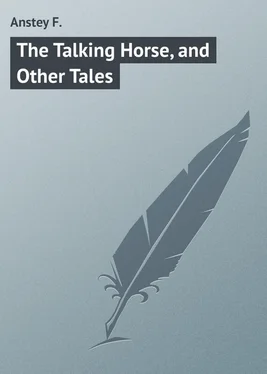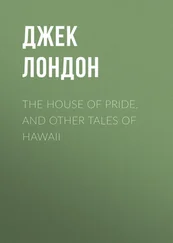F. Anstey - The Talking Horse, and Other Tales
Здесь есть возможность читать онлайн «F. Anstey - The Talking Horse, and Other Tales» — ознакомительный отрывок электронной книги совершенно бесплатно, а после прочтения отрывка купить полную версию. В некоторых случаях можно слушать аудио, скачать через торрент в формате fb2 и присутствует краткое содержание. Жанр: foreign_prose, foreign_language, на английском языке. Описание произведения, (предисловие) а так же отзывы посетителей доступны на портале библиотеки ЛибКат.
- Название:The Talking Horse, and Other Tales
- Автор:
- Жанр:
- Год:неизвестен
- ISBN:нет данных
- Рейтинг книги:4 / 5. Голосов: 1
-
Избранное:Добавить в избранное
- Отзывы:
-
Ваша оценка:
- 80
- 1
- 2
- 3
- 4
- 5
The Talking Horse, and Other Tales: краткое содержание, описание и аннотация
Предлагаем к чтению аннотацию, описание, краткое содержание или предисловие (зависит от того, что написал сам автор книги «The Talking Horse, and Other Tales»). Если вы не нашли необходимую информацию о книге — напишите в комментариях, мы постараемся отыскать её.
The Talking Horse, and Other Tales — читать онлайн ознакомительный отрывок
Ниже представлен текст книги, разбитый по страницам. Система сохранения места последней прочитанной страницы, позволяет с удобством читать онлайн бесплатно книгу «The Talking Horse, and Other Tales», без необходимости каждый раз заново искать на чём Вы остановились. Поставьте закладку, и сможете в любой момент перейти на страницу, на которой закончили чтение.
Интервал:
Закладка:
'Ah, you've been very industrious, evidently; it's unfortunate your jewels should all have been artificial – most unfortunate. I don't know how to explain it, unless' – (and here the old lady looked up queerly from under her white eyelashes), 'unless your goodness was artificial too?'
'How do you mean?' asked Priscilla, feeling strangely uncomfortable. 'I'm sure I've never done anything the least bit naughty – how can my goodness possibly be artificial?'
'Ah, that I can't explain; but I know this – that people who are really good are generally the last persons to suspect it, and the moment they become aware of it and begin to think how good they are, and how bad everybody else is, why, somehow or other, their goodness crumbles away and leaves only a sort of outside shell behind it. And – I'm very old, and of course I may be mistaken – but I think (I only say I think , mind) that a little girl so young as you must have some faults hidden about her somewhere, and that perhaps on the whole she would be better employed in trying to find them out and cure them before she attempted to correct those of other people. And I'm sure it can't be good for any child to be always seeing herself in a little picture, just as she likes to fancy other people see her. Very many pretty books are written about good little girls, and it is quite true that children may exercise a great influence for good – more than they can ever tell, perhaps – but only just so long as they remain natural and unconscious, and not unwholesome little pragmatical prigesses; for then they make themselves and other people worse than they might have been. But of course, my dear, you never made such a mistake as that!'
Priscilla turned very red, and began to scrape one of her feet against the other; she was thinking, and her thoughts were not at all pleasant ones.
'Oh, fairy,' she said at last, 'I'm afraid that's just what I did do. I was always thinking how good I was and putting everybody – papa, mamma, Alick, Betty, Aunt Margarine, Cathie, Belle, and even poor cousin Dick – right! I have been a horrid little hateful prig, and that's why all the jewels were rubbish. But, oh, shall I have to go on talking sham diamonds and things all the rest of my life?'
'That,' said the fairy, 'depends entirely on yourself. You have the remedy in your own hands – or lips.'
'Ah, you mean I needn't talk at all? But I must – sometimes. I couldn't bear to be dumb as long as I lived – and it would look so odd, too!'
'I never said you were not to open your lips at all. But can't you try to talk simply and naturally – not like little girls or boys in any story-books whatever – not to "show off" or improve people; only as a girl would talk who remembers that, after all, her elders are quite as likely as she is to know what they ought or ought not to do and say?'
'I shall forget sometimes, I know I shall!' said Priscilla disconsolately.
'If you do, there will be something to remind you, you know. And by and by, perhaps, as you grow up you may, quite by accident, say something sincere and noble and true – and then a jewel will fall which will really be of value!'
'No!' cried Priscilla, 'no, please ! Oh, fairy, let me off that! If I must drop them, let them be false ones to punish me – not real. I don't want to be rewarded any more for being good – if I ever am really good!'
'Come,' said the fairy, with a much pleasanter smile, 'you are not a hopeless case, at all events. It shall be as you wish, then, and perhaps it will be the wisest arrangement for all parties. Now run away home, and see how little use you can make of your fairy gift.'
Priscilla found her family still at breakfast.
'Why,' observed her father, raising his eyebrows as she entered the room, 'here's our little monitor – (or is it monitress , eh, Priscilla?) – back again. Children, we shall all have to mind our p's and q's – and, indeed, our entire alphabet, now!'
'I'm sure,' said her mother, kissing her fondly, 'Priscilla knows we're all delighted to have her home!'
' I'm not,' said Alick, with all a boy's engaging candour.
'Nor am I,' added Betty, 'it's been ever so much nicer at home while she's been away!'
Priscilla burst into tears as she hid her face upon her mother's protecting shoulder. 'It's true!' she sobbed, 'I don't deserve that you should be glad to see me – I've been hateful and horrid, I know – but, oh, if you'll only forgive me and love me and put up with me a little, I'll try not to preach and be a prig any more – I will truly!'
And at this her father called her to his side and embraced her with a fervour he had not shown for a very long time.
I should not like to go so far as to assert that no imitation diamond, ruby, pearl, or emerald ever proceeded from Priscilla's lips again. Habits are not cured in a day, and fairies – however old they may be – are still fairies; so it did occasionally happen that a mock jewel made an unwelcome appearance after one of Priscilla's more unguarded utterances. But she was always frightfully ashamed and abashed by such an accident, and buried the imitation stones immediately in a corner of the garden. And as time went on the jewels grew smaller and smaller, and frequently dissolved upon her tongue, leaving a faintly bitter taste, until at last they ceased altogether and Priscilla became as pleasant and unaffected a girl as she who may now be finishing this history.
Aunt Margarine never sent back the contents of that bandbox; she kept the biggest stones and had a brooch made of them, while, as she never mentioned that they were false, no one out of the family ever so much as suspected it.
But, for all that, she always declared that her niece Priscilla had bitterly disappointed her expectations – which was perhaps the truest thing that Aunt Margarine ever said.
A MATTER OF TASTE
PART I
It is a little singular that, upon an engagement becoming known and being discussed by the friends and acquaintances of the persons principally concerned, by far the most usual tone of comment should be a sorrowing wonder. That particular alliance is generally the very last that anybody ever expected. 'What made him choose her , of all people,' and 'What on earth she could see in him ,' are declared insoluble problems. It is confidently predicted that the engagement will never come to anything, or that, if such a marriage ever does take place, it is most unlikely to prove a success.
Sometimes, in the case of female friends, this tone is even perceptible under their warmest felicitations, and through the smiling mask of compliment shine eyes moist with the most irritating quality of compassion. 'So glad! so delighted! But why, why didn't you consult me ?' – this complicated expression might be rendered: 'I could have saved you from this – I was so pleased to hear of it!'
And yet, in the majority of cases, these unions are not found to turn out so very badly after all, and the misguided couple seem really to have gauged their own hearts and their possibilities of happiness together more accurately than the most clear-sighted of their acquaintances.
The announcement that Ella Hylton had accepted George Chapman provoked the customary sensation and surprise in their respective sets, and perhaps with rather more justification than usual.
Miss Hylton had undeniable beauty of a spiritual and rather exalté type, and was generally understood to be highly cultivated. She had spent a year at Somerville, though she had gone down without trying for a place in either 'Mods.' or 'Greats,' thereby preserving, if not increasing, her reputation for superiority. She had lived all her life among cultured people; she was devoted to music and regularly attended the Richter Concerts, though she could seldom be induced to play in public; she had a feeling for art, though she neither painted nor drew; a love of literature strong enough to deter her from all amateur efforts in that direction. In art, music and literature she was impatient of mediocrity; and, while she was as fond as most girls of the pleasures which upper middle-class society can offer, she reverenced intellect, and preferred the conversation of the plainest celebrity to the platitudes of the mere dancing-man, no matter how handsome of feature and perfect of step he might be.
Читать дальшеИнтервал:
Закладка:
Похожие книги на «The Talking Horse, and Other Tales»
Представляем Вашему вниманию похожие книги на «The Talking Horse, and Other Tales» списком для выбора. Мы отобрали схожую по названию и смыслу литературу в надежде предоставить читателям больше вариантов отыскать новые, интересные, ещё непрочитанные произведения.
Обсуждение, отзывы о книге «The Talking Horse, and Other Tales» и просто собственные мнения читателей. Оставьте ваши комментарии, напишите, что Вы думаете о произведении, его смысле или главных героях. Укажите что конкретно понравилось, а что нет, и почему Вы так считаете.












